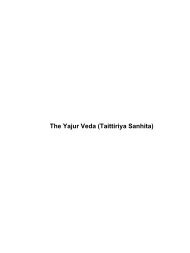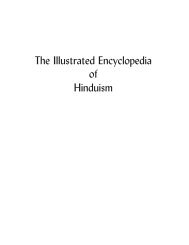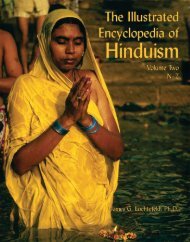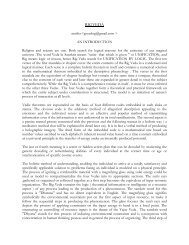A Concise Encyclopedia of Hinduism Klaus K Klostermaie
You also want an ePaper? Increase the reach of your titles
YUMPU automatically turns print PDFs into web optimized ePapers that Google loves.
prati-•flhäpana 142<br />
prati-•flhäpana<br />
The solemn installation and consecration<br />
<strong>of</strong> an IMAGE (mürti) through which the<br />
presence <strong>of</strong> a deity is called down and the<br />
image becomes an object <strong>of</strong> worship.<br />
pratyähära<br />
(‘withdrawal [<strong>of</strong> the senses]’)<br />
An important stage in PATAÑJALA YOGA.<br />
pratyak•a (‘perception’)<br />
The first and most important means <strong>of</strong><br />
pro<strong>of</strong>. (See also PRAMÄŒA.)<br />
pra-vøtti (‘progress’, ‘advance’)<br />
Active wordly life; projection. The<br />
opposite <strong>of</strong> NI-VØTTI.<br />
prayaÿcitta (‘atonement’)<br />
Action prescribed as penance for violation<br />
<strong>of</strong> precepts, such as repetition <strong>of</strong> a<br />
formula or bathing. There are long lists<br />
<strong>of</strong> prayaÿcittas that match specific<br />
atonements for particular breaches <strong>of</strong><br />
the law.<br />
predestination<br />
MADHVA teaches a kind <strong>of</strong> predestination,<br />
by insisting that certain persons<br />
(nitya baddhas) never reach release.<br />
premä (‘love’)<br />
In GAU¥ÏYA VAIÆŒAVISM, a designation<br />
<strong>of</strong> the highest form <strong>of</strong> love for Kø•æa,<br />
which transforms the devotee permanently.<br />
preta (‘ghost’)<br />
An evil spirit, the restless soul <strong>of</strong> a<br />
departed person who for some reason<br />
or other could not find a way to the<br />
beyond. There is a popular belief that<br />
people who commit suicide or people<br />
who have not atoned for a serious crime<br />
are condemned to haunt the world as<br />
pretas. Texts such as the Pretakalpa <strong>of</strong><br />
the Garuõa Puräæa give instructions on<br />
how to meet pretas and what to do to<br />
give them release.<br />
Pøthivï (‘the broad’)<br />
The earth, or the whole world. In the<br />
Vedas she is personified as mother <strong>of</strong> all<br />
beings. Her name is derived from<br />
PØTHU, who gave her life and thus was<br />
considered her father.<br />
Pøthu<br />
Son <strong>of</strong> VEŒA, the first rightful<br />
monarch on earth. He is credited with<br />
having introduced agriculture, and<br />
providing his subjects with peace and<br />
plenty.<br />
püjä<br />
Worship, especially <strong>of</strong> an IMAGE, usually<br />
an <strong>of</strong>fering <strong>of</strong> fruit, cooked food, water,<br />
incense, flowers etc. Each saƒpradäya<br />
(sect) has elaborate rules for the performance<br />
<strong>of</strong> püjä which have to be strictly<br />
followed by the devotees. As an act <strong>of</strong><br />
devotion püjä is both service to the deity<br />
and a means to win his/her favour. Püjä<br />
<strong>of</strong>fered daily at the home shrine is a<br />
scaled-down version <strong>of</strong> the grand services<br />
performed at temples, especially at<br />
festive occasions. It has to include a<br />
minimum <strong>of</strong> sixteen acts: avahana (invitation<br />
<strong>of</strong> the deity); äsana (<strong>of</strong>fering a<br />
seat); svagata (greeting); padya (washing<br />
the feet); arghya (rinsing the mouth<br />
and hands); acamanïya (water for sipping);<br />
madhuparka (<strong>of</strong>fering water<br />
mixed with honey); snäna or abhi•eka<br />
(bathing or sprinkling); vastra (clothing);<br />
gandha (perfumes); pu•pa (flowers);<br />
dhüpa (incense); dïpa (lamp); naivedya<br />
or prasäda (<strong>of</strong>fering food); nämaskära<br />
or praæäma (prostration); visarjana<br />
(send-<strong>of</strong>f).


















